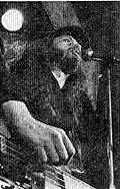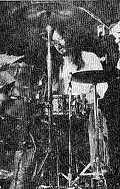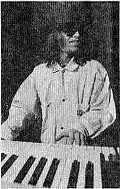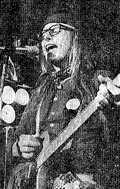Audio Archive | Press Archive | Photo Archive | Song Catalog | Discography | Biographies | Home Page | Order A CD | Video Archive
|
The St. Paul Dispatch. |
 |
| Friday March 12, 1976. Page 14. | |
| Audience. Entertainment and Arts. |
| A BAND APART |
| Skogie blends commentary, rock 'n' roll. |
| By LEE GARRICK Staff Writer |

|

|

|

|
|
Dennis Peterson.
Bass and Vocal. |
Allen J. Galles. Drums and Vocal. | Little Mark David Goldstein. Keyboards. |
Rick "Skogie" Moore. Guitar and Vocal. |
|
Five years is a long time to spend working in one rock 'n' roll band that specializes in energetic driving original rock, but Skogie is one such band. Skogie, first organized in 1971 as Skogie and the Flaming Pachucos, can be seen and heard in places like the Bronco Bar in Chanhassesn, the Blitz Bar and the Cabooze in Minneapolis, the Island Plaza in St. Paul Park, (beginning next Wednesday) and the Prior Place in Prior Lake (tonight and Saturday). "We're doing all right," said Skogie's Dennis Peterson in a recent interview at the Bronco. "It's just like working a steady job, five nights a week." SKOGIE IS RICK Moore on guitar, Peterson on Bass, All Galles playing Drums, and Little Mark David Goldstein on keyboards. Moore is 25, Peterson and Galles are 24, and Golstein is 21. Add to these Rick's brother, Bobby Moore, who works the lights and fills in part-time on saxophone, and Steve Brenner, the sound technician, bookkeeper and general right-hand man. Skogie on-stage is versatile enough to switch gears between social commentary and fairly straight, hard-driving rock-and-roll dance material. The musicianship ranges from good to above-average, The vocals are consistently solid and well harmonized. Originality is the element that sets Skogie apart. In the past, Moore and company have disclaimed all intention of satire, but now it creeps into their stage banter quite a bit, along with parody, one-liners and considerable camp. In ripping apart the Yes giant, "Roundabout," Skogie demonstrates an ability to lampoon pretensions of musical sophistication in rock. ("Everyone thinks 'Roundabout' is some kind of classic that deserves reverence." says Peterson, "but it's really just a very good rock 'n' roll song.") To demonstrate. Moore is introduced as the continental ballet star, Alfonzo Bozoini. Moore plays the famous "Roundabout" guitar intro while capering -- teetering really -- inexpertly and whimsically about the stage. While his dancing would hardly persuade a Rudolf Nureyev to burn his ballet slippers, it does successfully chide the song's psuedo-classicism. At one point, Bobby Moore holds cartoon thought balloon to his brother's head that says, "I'm really expressing myself!" SKOGIE'S stage patter can be like-wise irreverent. In one impromptu moment, Peterson and Moore carry on a fairly explicit lovers' dialog over the music. In another, the two play a scene between a teen-aged penitent and his lascivious confessor. Their banter is hardly the family variety. Years ago, in a show at the coffee house Extempore in Minneapolis, Moore was doing an Elvis Presley routine, wearing skin-tight trousers with zippered-up leggings. But the zippers burst, the pants flapped in the air during Moore's gyrations and the spectacle incensed Goldstein's mother, who had come to see the boys. She grabbed a public address microphone and began berating the band to all the world. Moore broke in on her scolding with a response, "After all, your son is a homosexual, y'know." Skogie's ability to get it on with the audience night after night seems at odds somehow with the band's history of the past five years, a record of hardships, disappointments and misconception all too characteristic of the business side of the music industry. "We play this stuff the way we do because we like it," Peterson said. "We're able to stay fairly fresh because we're involved with our material. Sometimes it gets hard to stay fresh, though. Like that three-week period -- that awful three weeks!" he said, covering his face with his hands as if to block out an aftershock of disbelief. The three weeks happened during a two-year (1973-1975) period when Skogie departed from their all-original-music locus and added a 15-minute early Beatles tribute to their set. The musicians were writing original songs with a fiendish zeal and converting their stuff into a recording effort that yielded their first, and thus far their only, single ("The Butler Did It"), and album, ("There's a String Attached to Almost Everything We Do"). "I guess we must have thought we were really getting hot at the time," Moore recalled. They had done well in a Walker Art Center concert and appeared on local television shows. Then came a connection with a semi-national talent agency and the timing seemed right to tour outside Minnesota. APART FROM SHORT tours around the Midwest and South (like a money-losing one-day hop to Chattanooga), the band booked a lengthy gig: five weeks on the road, including two weeks in Cleveland on Christmas Day, 1974. By mid-January the group was back in Minneapolis, having been laid off from three jobs in as many weeks. Unfortunately the booking agent had not done any research, when he paired Skogie with these particular clubs. "In Cleveland," Moore recalled, "they wanted a hairy-chested soul band and we looked liked a bunch of 19-year-old kids. We were playing nothing but our original music, some Beatles, and some Beach Boys." They split after five days. The agency got them a quick replacement job in Bay City, Michigan. "This was a supper club and they wanted dinner music, a show set, a dance set. The manager was real nice about it. He let us stay one week after we promised to learn a set of instrumental Muzak and book a $400 pay cut." Chastened, Skogie moved on to St. Louis. "That club wasn't too bad, although again it was an over-25 scene. It turned out to be the coldest week in 200 years. There was absolutely no business. We left after the first week." SKOGIE RETURNED to the Twin Cities. "We finished our album," Moore said, "but I think we were sort of changed by the experience. We went back to concentrating more on writing our own material again." Still, the early Beatles tribute was making money and the band kept it up for almost another year when another long tour came along, this time to Canada. The Canadian jaunt included a stint in a club in Quebec City. "It seemed like no one spoke English there so our stage banter was falling dead," Peterson recalled. "It was a completely absurd situation. We started doing all sorts of crazy things, calling the people dumb canucks and all that, and then they started enjoying themselves. I think that told us something about what we should be doing. Moore said the Beatles medley had come about for several reasons, including Skogie's lingering infatuation with the 1960s Beatles songs. "But we were concerned, too, about not being taken seriously as musicians, I think. We were afraid we'd get stuck with a fun-time-only tag." Today, Skogie seem to be resting easier with that tag firmly pinned to its reputation. Plans still include hopes for success in music, the business wise boys of Skogie plan more carefully. Their various adventures into fame and fortune, after suffering business losses while touring to promote their album to a semi-national audience, left them about $10,000 in arrears. In 1976, they've just about dug themselves out of that hole. The material for their second album is ready, but they want a national recording contract or some sort of firm distribution agreement with a recognized label before they'll start recording sessions. The humor is sharper now, too, tempered perhaps by experience. "Maybe we're more aware now of making a deeper social comment," Moore said. "You learn with experience. Right now we're mainly trying to get by." |
Audio Archive | Press Archive | Photo Archive | Song Catalog | Discography | Biographies | Home Page | Order A CD | Video Archive